Contract Law and Negligence for Elixir Gardens - LAW011-1
VerifiedAdded on 2022/12/12
|13
|2974
|490
Report
AI Summary
This assignment report analyzes contract law principles, specifically focusing on offer and acceptance, consideration, and intention to create legal relations, using case law such as Carlill v Carbolic Smoke Ball Company and Smith v Hughes. It then examines a scenario involving a father-son agreement, determining Ringo's liability to pay Paul based on contract law principles. The report further investigates a negligence claim against George, an employee of Elixir Garden, applying the four elements of negligence: duty of care, breach, causation, and damage, referencing cases like Donoghue v Stevenson and Nettleship v Weston. Finally, the report evaluates the most suitable business structure for Ringo, John, and Yoko's partnership, highlighting the advantages of a partnership, such as easy formation and flexibility. The report provides legal analysis of scenarios related to Elixir Gardens, offering a comprehensive understanding of relevant legal concepts.
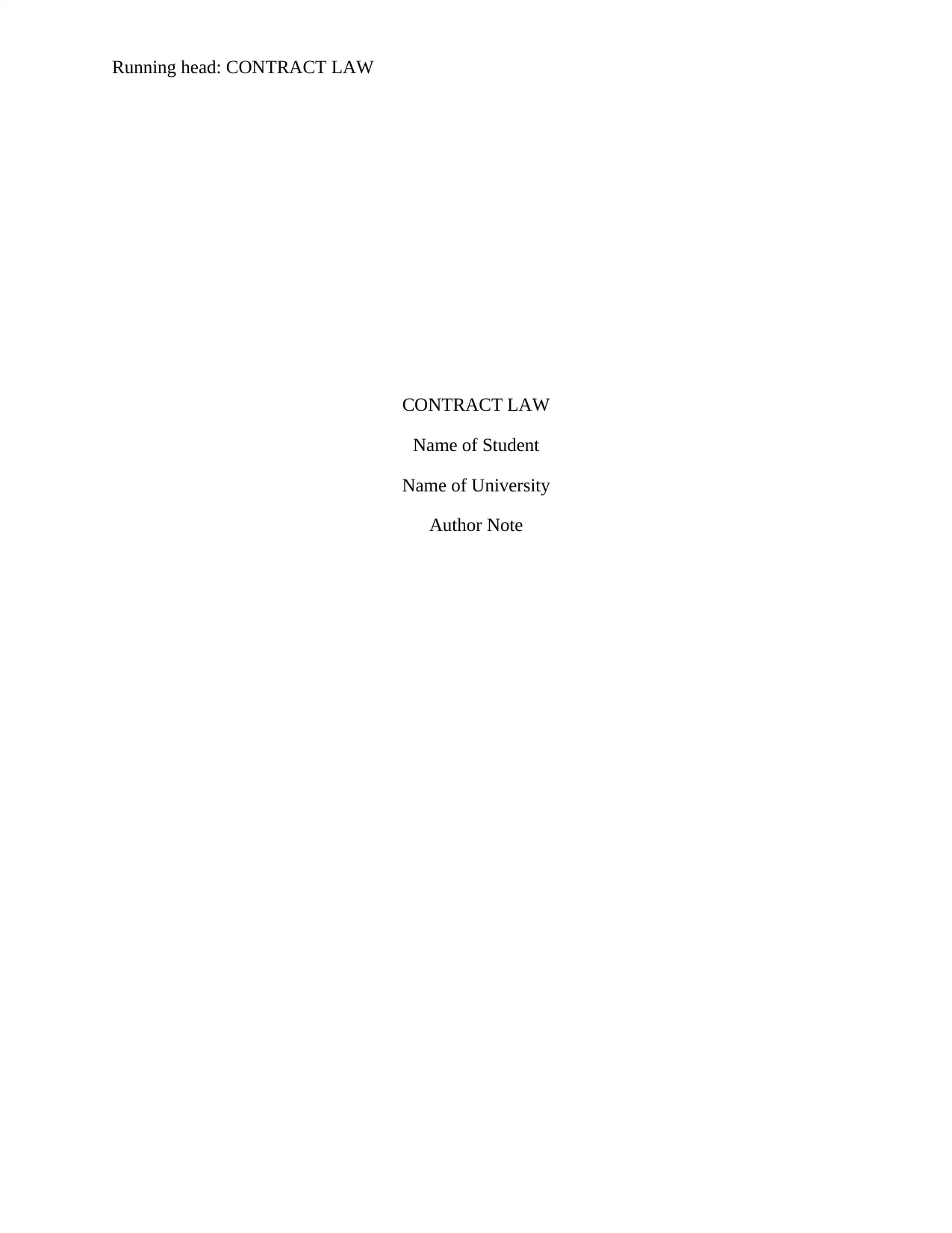
Running head: CONTRACT LAW
CONTRACT LAW
Name of Student
Name of University
Author Note
CONTRACT LAW
Name of Student
Name of University
Author Note
Paraphrase This Document
Need a fresh take? Get an instant paraphrase of this document with our AI Paraphraser
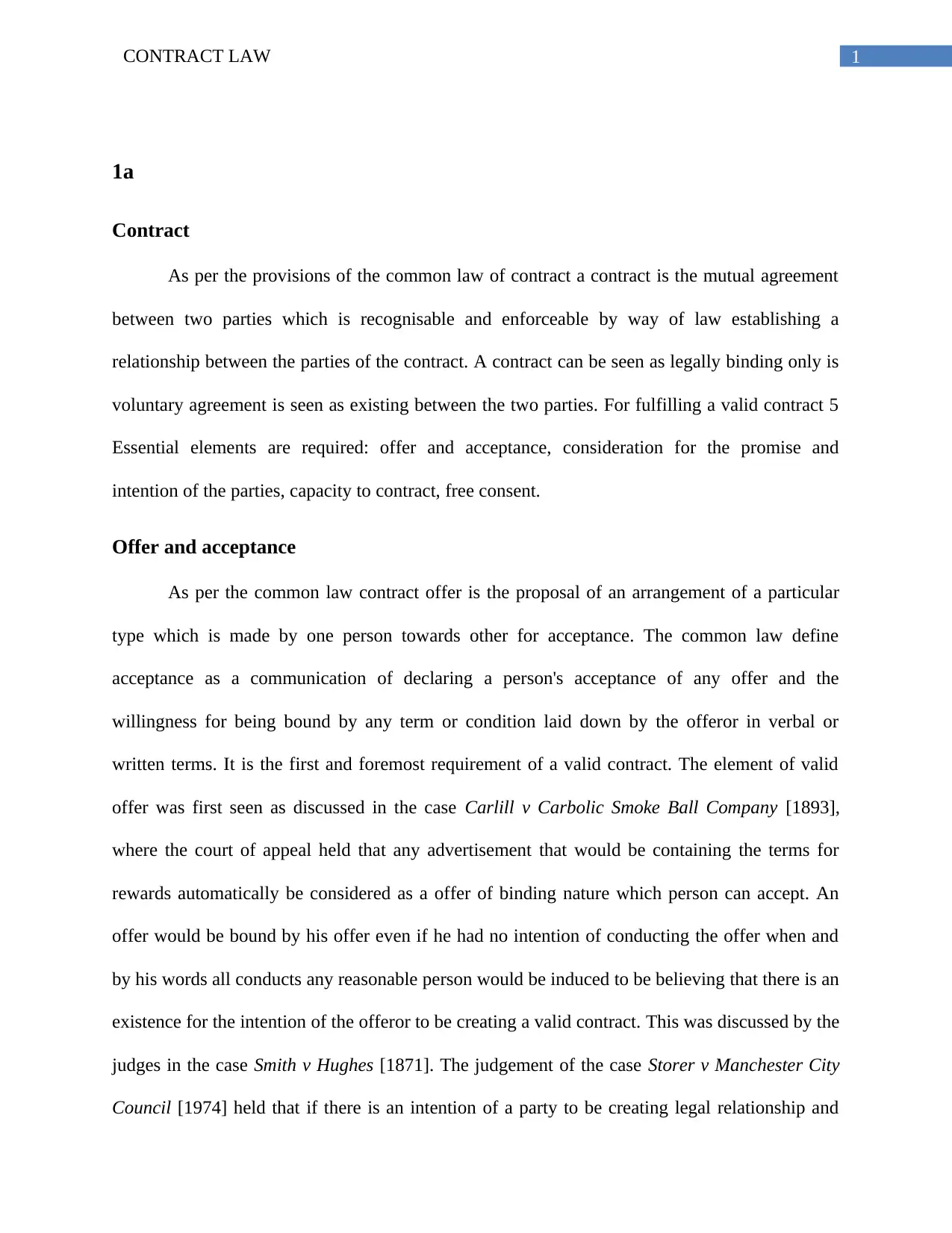
1CONTRACT LAW
1a
Contract
As per the provisions of the common law of contract a contract is the mutual agreement
between two parties which is recognisable and enforceable by way of law establishing a
relationship between the parties of the contract. A contract can be seen as legally binding only is
voluntary agreement is seen as existing between the two parties. For fulfilling a valid contract 5
Essential elements are required: offer and acceptance, consideration for the promise and
intention of the parties, capacity to contract, free consent.
Offer and acceptance
As per the common law contract offer is the proposal of an arrangement of a particular
type which is made by one person towards other for acceptance. The common law define
acceptance as a communication of declaring a person's acceptance of any offer and the
willingness for being bound by any term or condition laid down by the offeror in verbal or
written terms. It is the first and foremost requirement of a valid contract. The element of valid
offer was first seen as discussed in the case Carlill v Carbolic Smoke Ball Company [1893],
where the court of appeal held that any advertisement that would be containing the terms for
rewards automatically be considered as a offer of binding nature which person can accept. An
offer would be bound by his offer even if he had no intention of conducting the offer when and
by his words all conducts any reasonable person would be induced to be believing that there is an
existence for the intention of the offeror to be creating a valid contract. This was discussed by the
judges in the case Smith v Hughes [1871]. The judgement of the case Storer v Manchester City
Council [1974] held that if there is an intention of a party to be creating legal relationship and
1a
Contract
As per the provisions of the common law of contract a contract is the mutual agreement
between two parties which is recognisable and enforceable by way of law establishing a
relationship between the parties of the contract. A contract can be seen as legally binding only is
voluntary agreement is seen as existing between the two parties. For fulfilling a valid contract 5
Essential elements are required: offer and acceptance, consideration for the promise and
intention of the parties, capacity to contract, free consent.
Offer and acceptance
As per the common law contract offer is the proposal of an arrangement of a particular
type which is made by one person towards other for acceptance. The common law define
acceptance as a communication of declaring a person's acceptance of any offer and the
willingness for being bound by any term or condition laid down by the offeror in verbal or
written terms. It is the first and foremost requirement of a valid contract. The element of valid
offer was first seen as discussed in the case Carlill v Carbolic Smoke Ball Company [1893],
where the court of appeal held that any advertisement that would be containing the terms for
rewards automatically be considered as a offer of binding nature which person can accept. An
offer would be bound by his offer even if he had no intention of conducting the offer when and
by his words all conducts any reasonable person would be induced to be believing that there is an
existence for the intention of the offeror to be creating a valid contract. This was discussed by the
judges in the case Smith v Hughes [1871]. The judgement of the case Storer v Manchester City
Council [1974] held that if there is an intention of a party to be creating legal relationship and
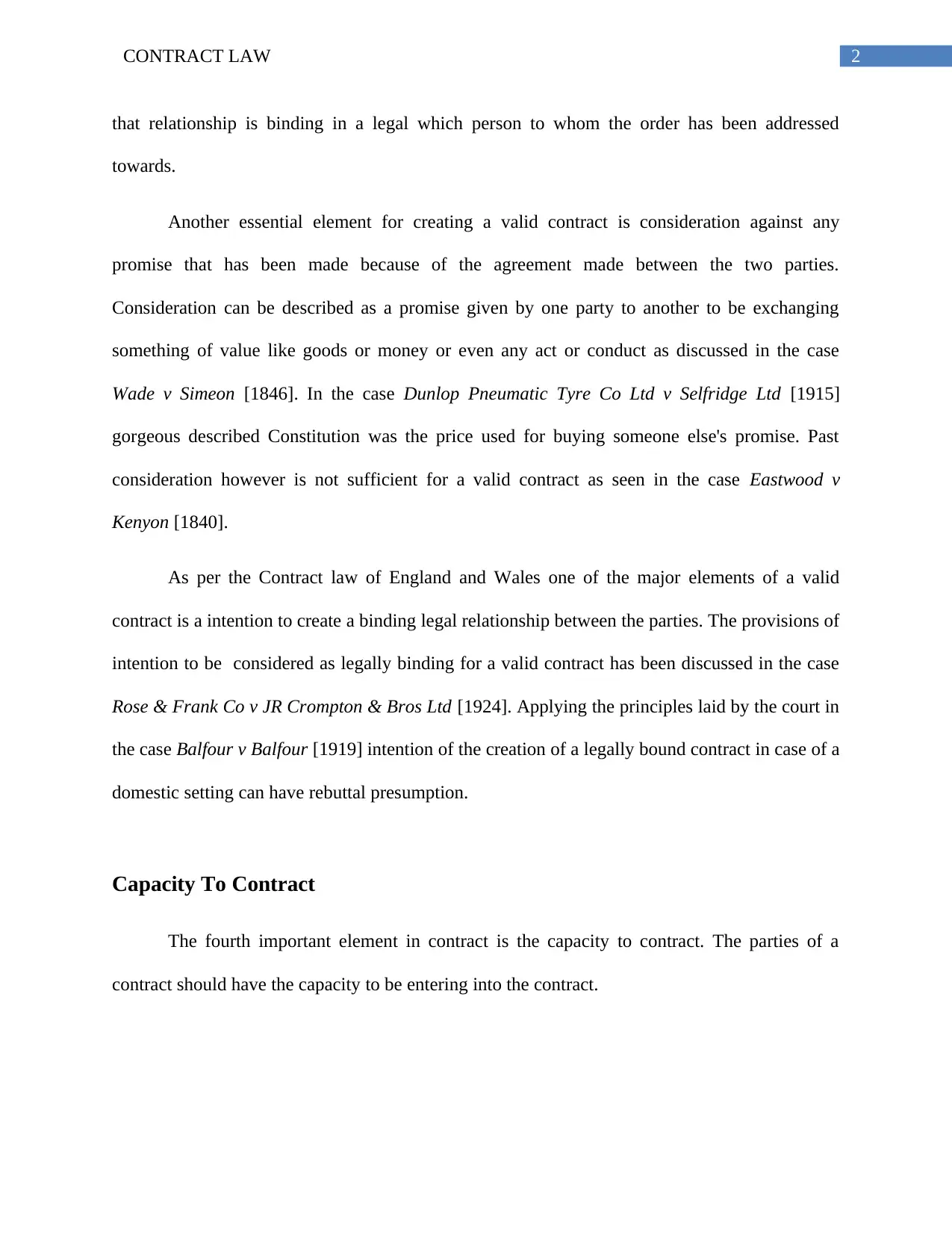
2CONTRACT LAW
that relationship is binding in a legal which person to whom the order has been addressed
towards.
Another essential element for creating a valid contract is consideration against any
promise that has been made because of the agreement made between the two parties.
Consideration can be described as a promise given by one party to another to be exchanging
something of value like goods or money or even any act or conduct as discussed in the case
Wade v Simeon [1846]. In the case Dunlop Pneumatic Tyre Co Ltd v Selfridge Ltd [1915]
gorgeous described Constitution was the price used for buying someone else's promise. Past
consideration however is not sufficient for a valid contract as seen in the case Eastwood v
Kenyon [1840].
As per the Contract law of England and Wales one of the major elements of a valid
contract is a intention to create a binding legal relationship between the parties. The provisions of
intention to be considered as legally binding for a valid contract has been discussed in the case
Rose & Frank Co v JR Crompton & Bros Ltd [1924]. Applying the principles laid by the court in
the case Balfour v Balfour [1919] intention of the creation of a legally bound contract in case of a
domestic setting can have rebuttal presumption.
Capacity To Contract
The fourth important element in contract is the capacity to contract. The parties of a
contract should have the capacity to be entering into the contract.
that relationship is binding in a legal which person to whom the order has been addressed
towards.
Another essential element for creating a valid contract is consideration against any
promise that has been made because of the agreement made between the two parties.
Consideration can be described as a promise given by one party to another to be exchanging
something of value like goods or money or even any act or conduct as discussed in the case
Wade v Simeon [1846]. In the case Dunlop Pneumatic Tyre Co Ltd v Selfridge Ltd [1915]
gorgeous described Constitution was the price used for buying someone else's promise. Past
consideration however is not sufficient for a valid contract as seen in the case Eastwood v
Kenyon [1840].
As per the Contract law of England and Wales one of the major elements of a valid
contract is a intention to create a binding legal relationship between the parties. The provisions of
intention to be considered as legally binding for a valid contract has been discussed in the case
Rose & Frank Co v JR Crompton & Bros Ltd [1924]. Applying the principles laid by the court in
the case Balfour v Balfour [1919] intention of the creation of a legally bound contract in case of a
domestic setting can have rebuttal presumption.
Capacity To Contract
The fourth important element in contract is the capacity to contract. The parties of a
contract should have the capacity to be entering into the contract.
⊘ This is a preview!⊘
Do you want full access?
Subscribe today to unlock all pages.

Trusted by 1+ million students worldwide
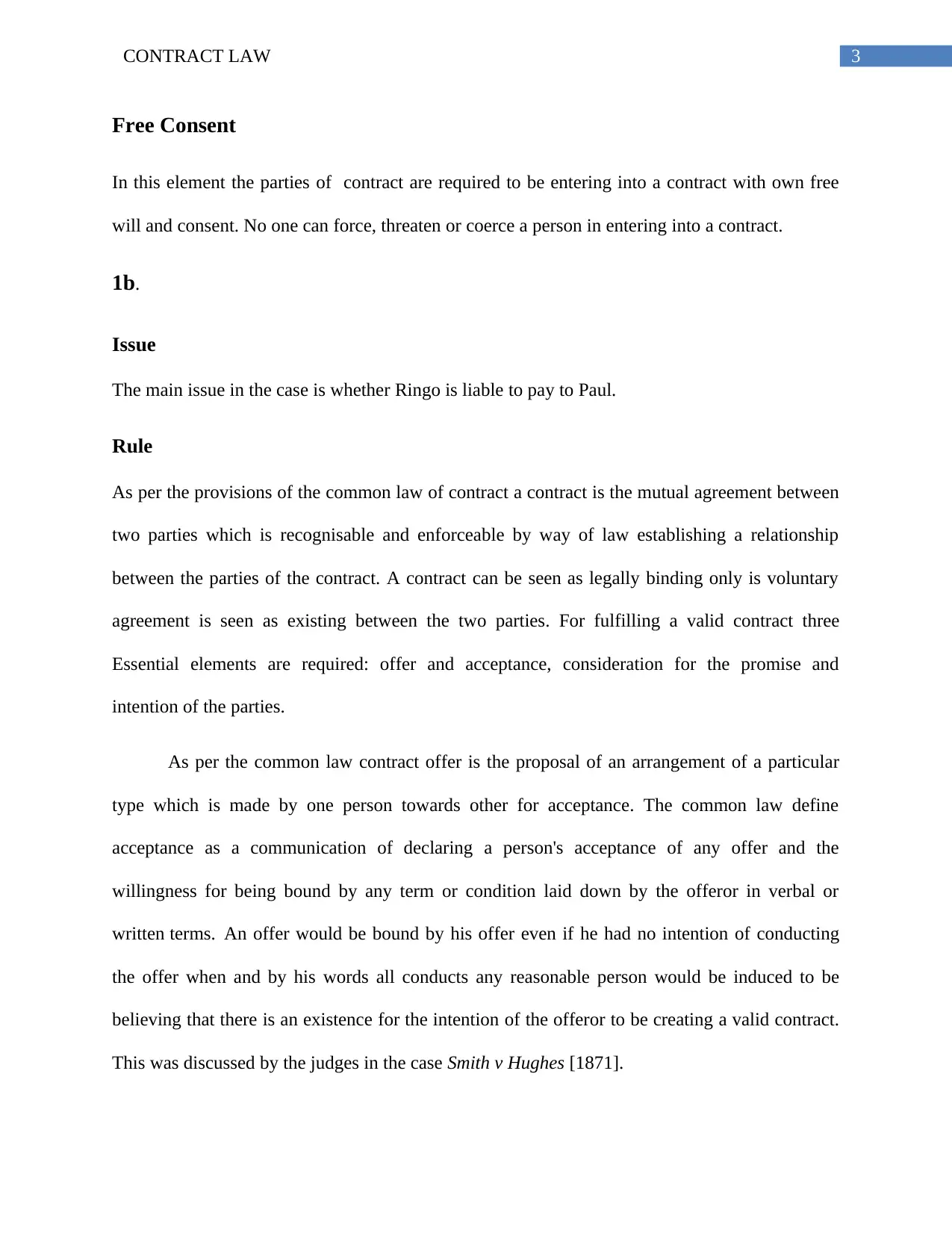
3CONTRACT LAW
Free Consent
In this element the parties of contract are required to be entering into a contract with own free
will and consent. No one can force, threaten or coerce a person in entering into a contract.
1b.
Issue
The main issue in the case is whether Ringo is liable to pay to Paul.
Rule
As per the provisions of the common law of contract a contract is the mutual agreement between
two parties which is recognisable and enforceable by way of law establishing a relationship
between the parties of the contract. A contract can be seen as legally binding only is voluntary
agreement is seen as existing between the two parties. For fulfilling a valid contract three
Essential elements are required: offer and acceptance, consideration for the promise and
intention of the parties.
As per the common law contract offer is the proposal of an arrangement of a particular
type which is made by one person towards other for acceptance. The common law define
acceptance as a communication of declaring a person's acceptance of any offer and the
willingness for being bound by any term or condition laid down by the offeror in verbal or
written terms. An offer would be bound by his offer even if he had no intention of conducting
the offer when and by his words all conducts any reasonable person would be induced to be
believing that there is an existence for the intention of the offeror to be creating a valid contract.
This was discussed by the judges in the case Smith v Hughes [1871].
Free Consent
In this element the parties of contract are required to be entering into a contract with own free
will and consent. No one can force, threaten or coerce a person in entering into a contract.
1b.
Issue
The main issue in the case is whether Ringo is liable to pay to Paul.
Rule
As per the provisions of the common law of contract a contract is the mutual agreement between
two parties which is recognisable and enforceable by way of law establishing a relationship
between the parties of the contract. A contract can be seen as legally binding only is voluntary
agreement is seen as existing between the two parties. For fulfilling a valid contract three
Essential elements are required: offer and acceptance, consideration for the promise and
intention of the parties.
As per the common law contract offer is the proposal of an arrangement of a particular
type which is made by one person towards other for acceptance. The common law define
acceptance as a communication of declaring a person's acceptance of any offer and the
willingness for being bound by any term or condition laid down by the offeror in verbal or
written terms. An offer would be bound by his offer even if he had no intention of conducting
the offer when and by his words all conducts any reasonable person would be induced to be
believing that there is an existence for the intention of the offeror to be creating a valid contract.
This was discussed by the judges in the case Smith v Hughes [1871].
Paraphrase This Document
Need a fresh take? Get an instant paraphrase of this document with our AI Paraphraser
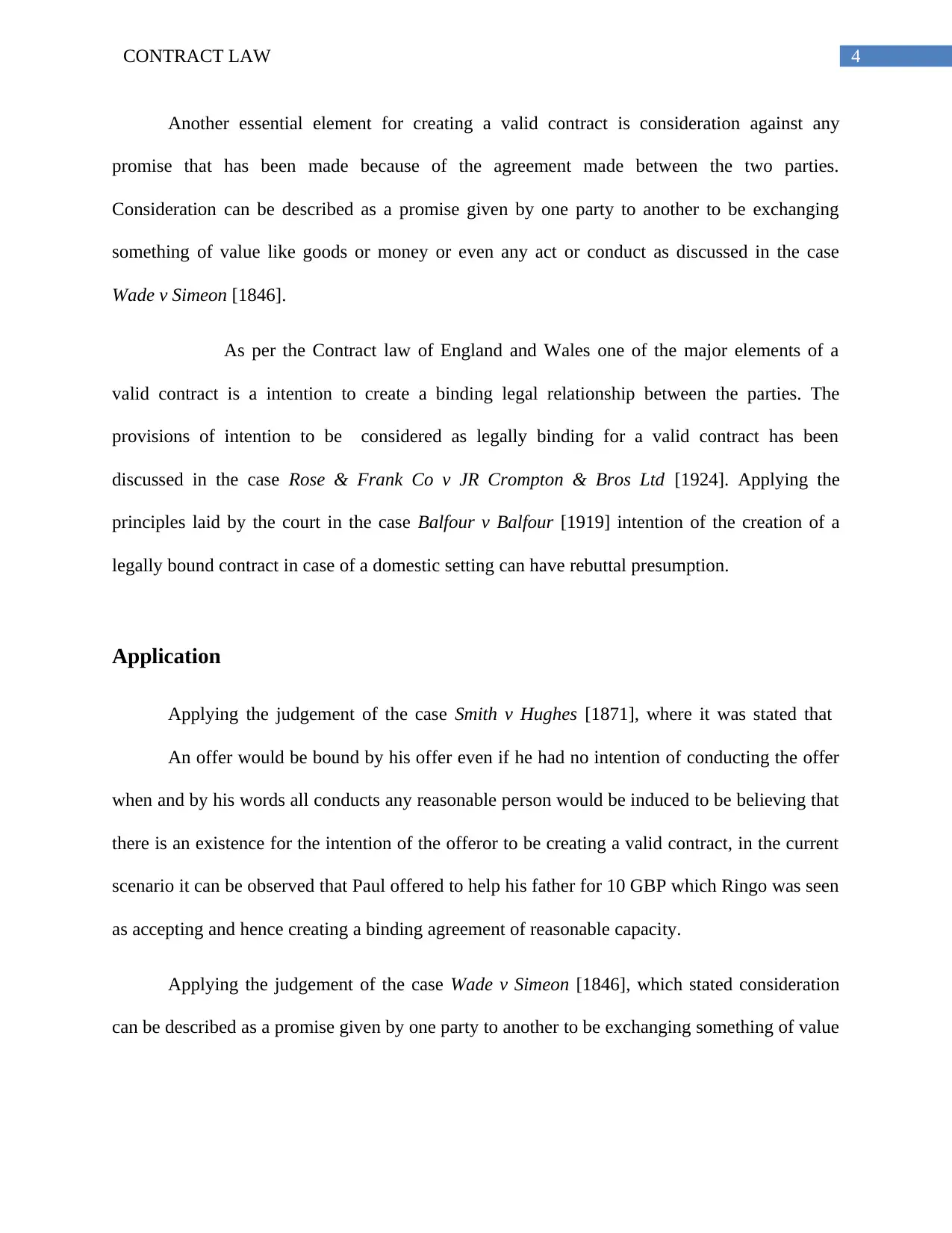
4CONTRACT LAW
Another essential element for creating a valid contract is consideration against any
promise that has been made because of the agreement made between the two parties.
Consideration can be described as a promise given by one party to another to be exchanging
something of value like goods or money or even any act or conduct as discussed in the case
Wade v Simeon [1846].
As per the Contract law of England and Wales one of the major elements of a
valid contract is a intention to create a binding legal relationship between the parties. The
provisions of intention to be considered as legally binding for a valid contract has been
discussed in the case Rose & Frank Co v JR Crompton & Bros Ltd [1924]. Applying the
principles laid by the court in the case Balfour v Balfour [1919] intention of the creation of a
legally bound contract in case of a domestic setting can have rebuttal presumption.
Application
Applying the judgement of the case Smith v Hughes [1871], where it was stated that
An offer would be bound by his offer even if he had no intention of conducting the offer
when and by his words all conducts any reasonable person would be induced to be believing that
there is an existence for the intention of the offeror to be creating a valid contract, in the current
scenario it can be observed that Paul offered to help his father for 10 GBP which Ringo was seen
as accepting and hence creating a binding agreement of reasonable capacity.
Applying the judgement of the case Wade v Simeon [1846], which stated consideration
can be described as a promise given by one party to another to be exchanging something of value
Another essential element for creating a valid contract is consideration against any
promise that has been made because of the agreement made between the two parties.
Consideration can be described as a promise given by one party to another to be exchanging
something of value like goods or money or even any act or conduct as discussed in the case
Wade v Simeon [1846].
As per the Contract law of England and Wales one of the major elements of a
valid contract is a intention to create a binding legal relationship between the parties. The
provisions of intention to be considered as legally binding for a valid contract has been
discussed in the case Rose & Frank Co v JR Crompton & Bros Ltd [1924]. Applying the
principles laid by the court in the case Balfour v Balfour [1919] intention of the creation of a
legally bound contract in case of a domestic setting can have rebuttal presumption.
Application
Applying the judgement of the case Smith v Hughes [1871], where it was stated that
An offer would be bound by his offer even if he had no intention of conducting the offer
when and by his words all conducts any reasonable person would be induced to be believing that
there is an existence for the intention of the offeror to be creating a valid contract, in the current
scenario it can be observed that Paul offered to help his father for 10 GBP which Ringo was seen
as accepting and hence creating a binding agreement of reasonable capacity.
Applying the judgement of the case Wade v Simeon [1846], which stated consideration
can be described as a promise given by one party to another to be exchanging something of value
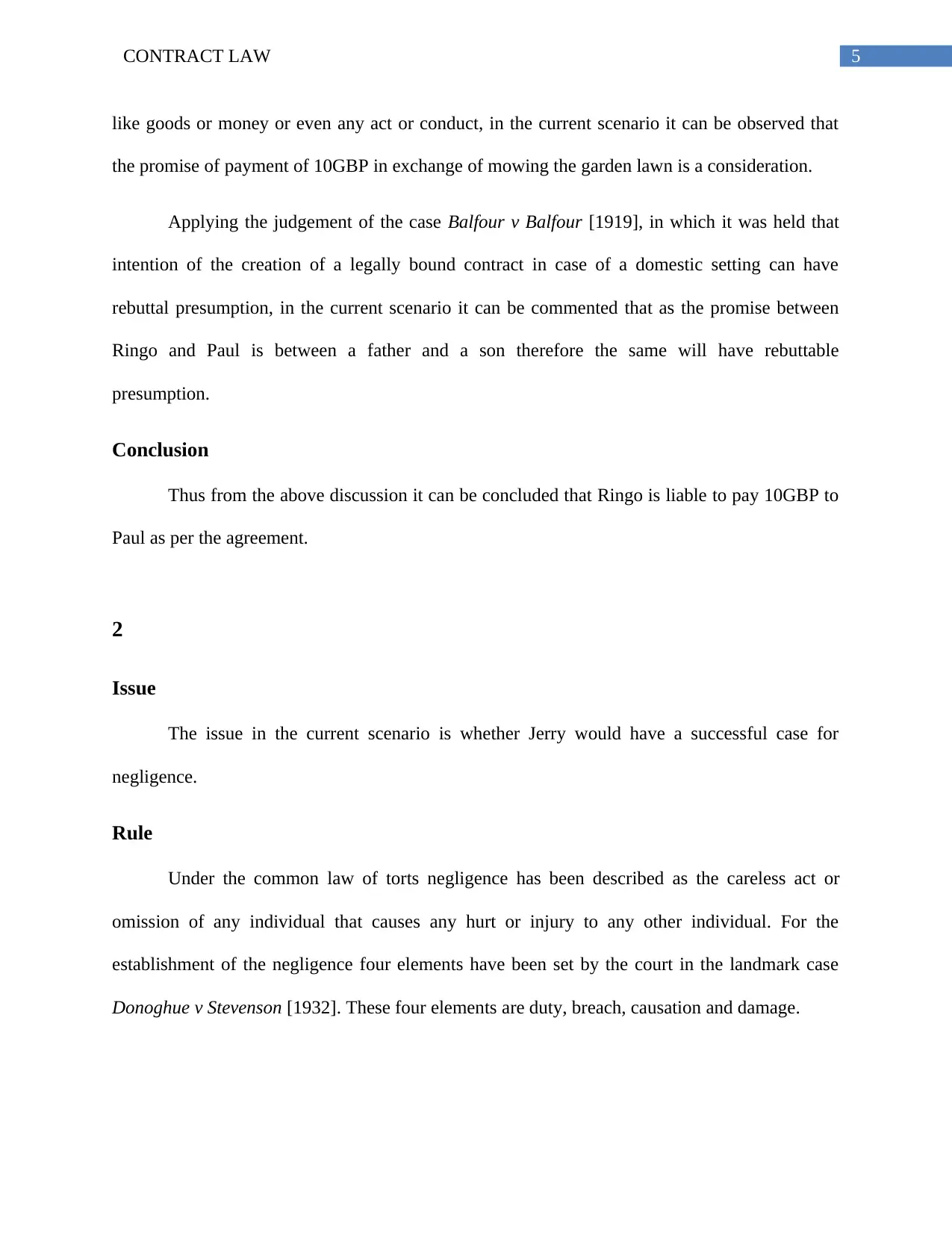
5CONTRACT LAW
like goods or money or even any act or conduct, in the current scenario it can be observed that
the promise of payment of 10GBP in exchange of mowing the garden lawn is a consideration.
Applying the judgement of the case Balfour v Balfour [1919], in which it was held that
intention of the creation of a legally bound contract in case of a domestic setting can have
rebuttal presumption, in the current scenario it can be commented that as the promise between
Ringo and Paul is between a father and a son therefore the same will have rebuttable
presumption.
Conclusion
Thus from the above discussion it can be concluded that Ringo is liable to pay 10GBP to
Paul as per the agreement.
2
Issue
The issue in the current scenario is whether Jerry would have a successful case for
negligence.
Rule
Under the common law of torts negligence has been described as the careless act or
omission of any individual that causes any hurt or injury to any other individual. For the
establishment of the negligence four elements have been set by the court in the landmark case
Donoghue v Stevenson [1932]. These four elements are duty, breach, causation and damage.
like goods or money or even any act or conduct, in the current scenario it can be observed that
the promise of payment of 10GBP in exchange of mowing the garden lawn is a consideration.
Applying the judgement of the case Balfour v Balfour [1919], in which it was held that
intention of the creation of a legally bound contract in case of a domestic setting can have
rebuttal presumption, in the current scenario it can be commented that as the promise between
Ringo and Paul is between a father and a son therefore the same will have rebuttable
presumption.
Conclusion
Thus from the above discussion it can be concluded that Ringo is liable to pay 10GBP to
Paul as per the agreement.
2
Issue
The issue in the current scenario is whether Jerry would have a successful case for
negligence.
Rule
Under the common law of torts negligence has been described as the careless act or
omission of any individual that causes any hurt or injury to any other individual. For the
establishment of the negligence four elements have been set by the court in the landmark case
Donoghue v Stevenson [1932]. These four elements are duty, breach, causation and damage.
⊘ This is a preview!⊘
Do you want full access?
Subscribe today to unlock all pages.

Trusted by 1+ million students worldwide
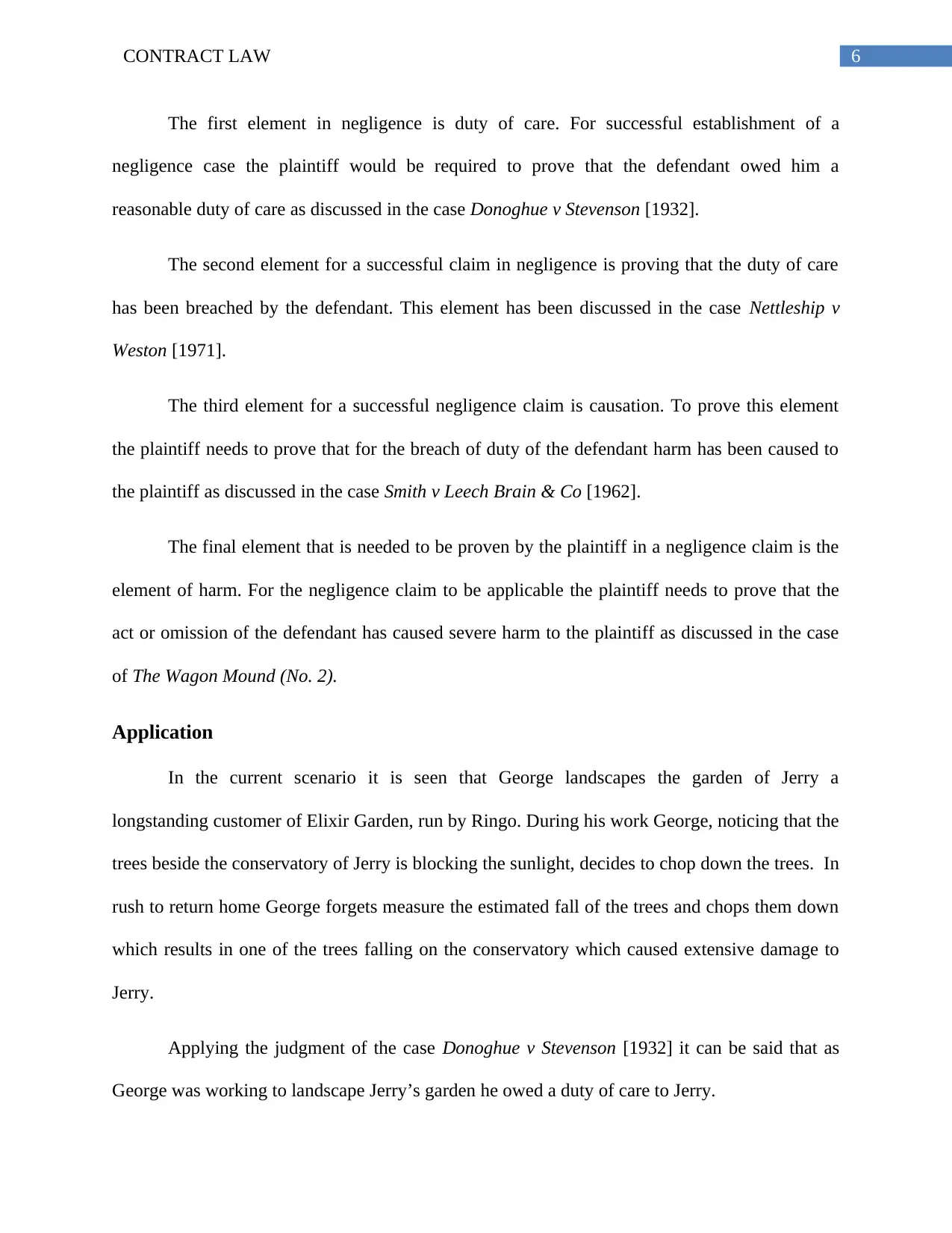
6CONTRACT LAW
The first element in negligence is duty of care. For successful establishment of a
negligence case the plaintiff would be required to prove that the defendant owed him a
reasonable duty of care as discussed in the case Donoghue v Stevenson [1932].
The second element for a successful claim in negligence is proving that the duty of care
has been breached by the defendant. This element has been discussed in the case Nettleship v
Weston [1971].
The third element for a successful negligence claim is causation. To prove this element
the plaintiff needs to prove that for the breach of duty of the defendant harm has been caused to
the plaintiff as discussed in the case Smith v Leech Brain & Co [1962].
The final element that is needed to be proven by the plaintiff in a negligence claim is the
element of harm. For the negligence claim to be applicable the plaintiff needs to prove that the
act or omission of the defendant has caused severe harm to the plaintiff as discussed in the case
of The Wagon Mound (No. 2).
Application
In the current scenario it is seen that George landscapes the garden of Jerry a
longstanding customer of Elixir Garden, run by Ringo. During his work George, noticing that the
trees beside the conservatory of Jerry is blocking the sunlight, decides to chop down the trees. In
rush to return home George forgets measure the estimated fall of the trees and chops them down
which results in one of the trees falling on the conservatory which caused extensive damage to
Jerry.
Applying the judgment of the case Donoghue v Stevenson [1932] it can be said that as
George was working to landscape Jerry’s garden he owed a duty of care to Jerry.
The first element in negligence is duty of care. For successful establishment of a
negligence case the plaintiff would be required to prove that the defendant owed him a
reasonable duty of care as discussed in the case Donoghue v Stevenson [1932].
The second element for a successful claim in negligence is proving that the duty of care
has been breached by the defendant. This element has been discussed in the case Nettleship v
Weston [1971].
The third element for a successful negligence claim is causation. To prove this element
the plaintiff needs to prove that for the breach of duty of the defendant harm has been caused to
the plaintiff as discussed in the case Smith v Leech Brain & Co [1962].
The final element that is needed to be proven by the plaintiff in a negligence claim is the
element of harm. For the negligence claim to be applicable the plaintiff needs to prove that the
act or omission of the defendant has caused severe harm to the plaintiff as discussed in the case
of The Wagon Mound (No. 2).
Application
In the current scenario it is seen that George landscapes the garden of Jerry a
longstanding customer of Elixir Garden, run by Ringo. During his work George, noticing that the
trees beside the conservatory of Jerry is blocking the sunlight, decides to chop down the trees. In
rush to return home George forgets measure the estimated fall of the trees and chops them down
which results in one of the trees falling on the conservatory which caused extensive damage to
Jerry.
Applying the judgment of the case Donoghue v Stevenson [1932] it can be said that as
George was working to landscape Jerry’s garden he owed a duty of care to Jerry.
Paraphrase This Document
Need a fresh take? Get an instant paraphrase of this document with our AI Paraphraser
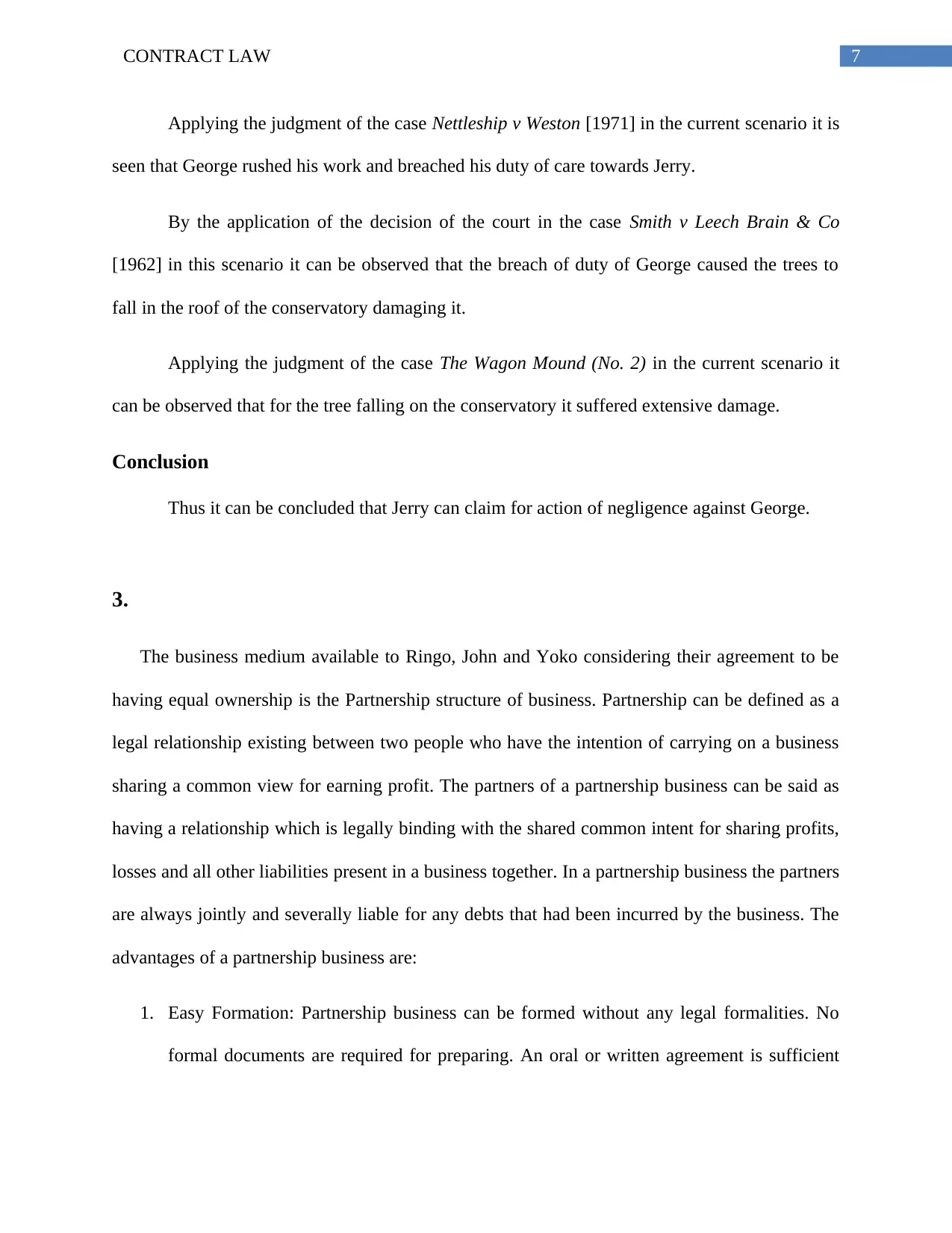
7CONTRACT LAW
Applying the judgment of the case Nettleship v Weston [1971] in the current scenario it is
seen that George rushed his work and breached his duty of care towards Jerry.
By the application of the decision of the court in the case Smith v Leech Brain & Co
[1962] in this scenario it can be observed that the breach of duty of George caused the trees to
fall in the roof of the conservatory damaging it.
Applying the judgment of the case The Wagon Mound (No. 2) in the current scenario it
can be observed that for the tree falling on the conservatory it suffered extensive damage.
Conclusion
Thus it can be concluded that Jerry can claim for action of negligence against George.
3.
The business medium available to Ringo, John and Yoko considering their agreement to be
having equal ownership is the Partnership structure of business. Partnership can be defined as a
legal relationship existing between two people who have the intention of carrying on a business
sharing a common view for earning profit. The partners of a partnership business can be said as
having a relationship which is legally binding with the shared common intent for sharing profits,
losses and all other liabilities present in a business together. In a partnership business the partners
are always jointly and severally liable for any debts that had been incurred by the business. The
advantages of a partnership business are:
1. Easy Formation: Partnership business can be formed without any legal formalities. No
formal documents are required for preparing. An oral or written agreement is sufficient
Applying the judgment of the case Nettleship v Weston [1971] in the current scenario it is
seen that George rushed his work and breached his duty of care towards Jerry.
By the application of the decision of the court in the case Smith v Leech Brain & Co
[1962] in this scenario it can be observed that the breach of duty of George caused the trees to
fall in the roof of the conservatory damaging it.
Applying the judgment of the case The Wagon Mound (No. 2) in the current scenario it
can be observed that for the tree falling on the conservatory it suffered extensive damage.
Conclusion
Thus it can be concluded that Jerry can claim for action of negligence against George.
3.
The business medium available to Ringo, John and Yoko considering their agreement to be
having equal ownership is the Partnership structure of business. Partnership can be defined as a
legal relationship existing between two people who have the intention of carrying on a business
sharing a common view for earning profit. The partners of a partnership business can be said as
having a relationship which is legally binding with the shared common intent for sharing profits,
losses and all other liabilities present in a business together. In a partnership business the partners
are always jointly and severally liable for any debts that had been incurred by the business. The
advantages of a partnership business are:
1. Easy Formation: Partnership business can be formed without any legal formalities. No
formal documents are required for preparing. An oral or written agreement is sufficient
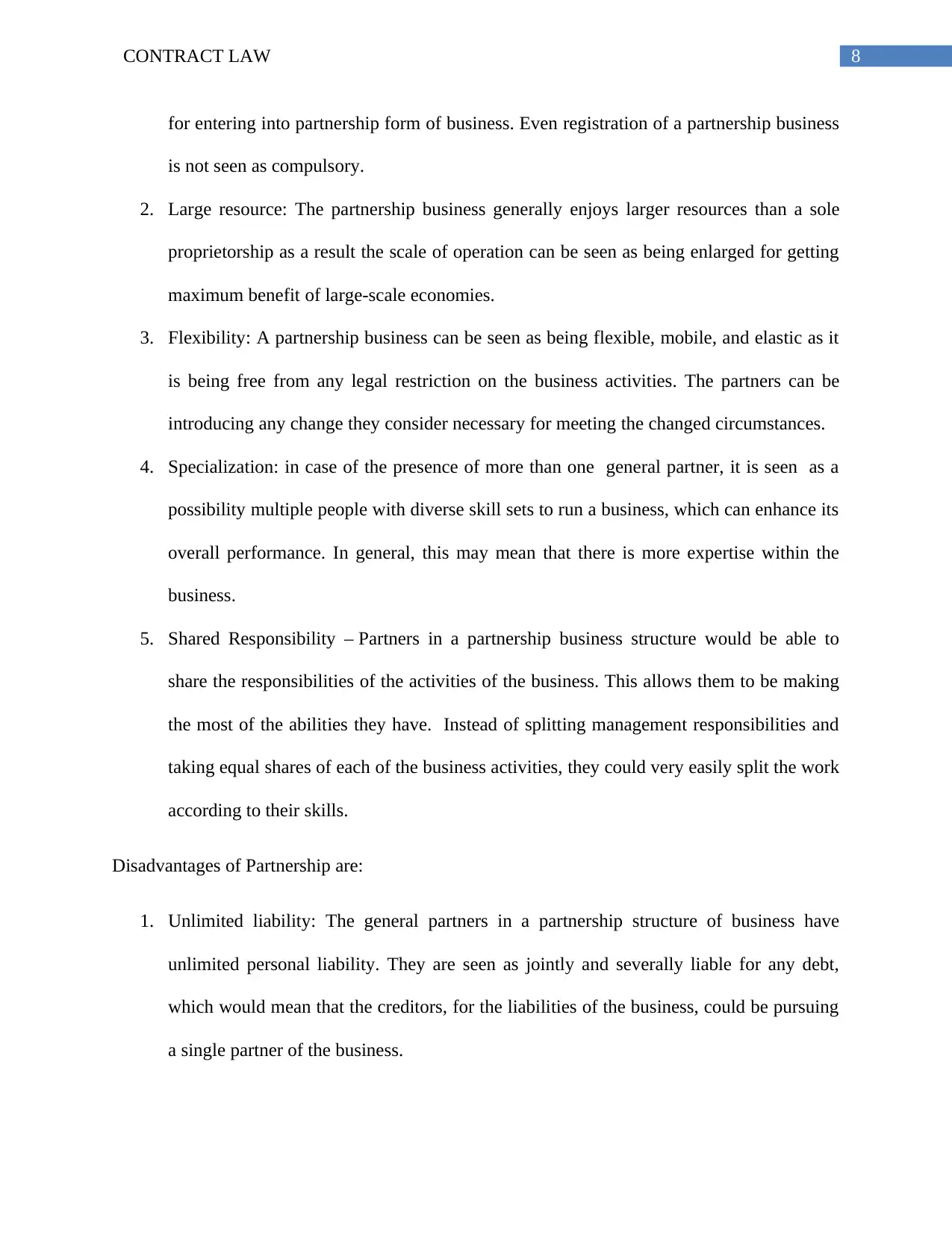
8CONTRACT LAW
for entering into partnership form of business. Even registration of a partnership business
is not seen as compulsory.
2. Large resource: The partnership business generally enjoys larger resources than a sole
proprietorship as a result the scale of operation can be seen as being enlarged for getting
maximum benefit of large-scale economies.
3. Flexibility: A partnership business can be seen as being flexible, mobile, and elastic as it
is being free from any legal restriction on the business activities. The partners can be
introducing any change they consider necessary for meeting the changed circumstances.
4. Specialization: in case of the presence of more than one general partner, it is seen as a
possibility multiple people with diverse skill sets to run a business, which can enhance its
overall performance. In general, this may mean that there is more expertise within the
business.
5. Shared Responsibility – Partners in a partnership business structure would be able to
share the responsibilities of the activities of the business. This allows them to be making
the most of the abilities they have. Instead of splitting management responsibilities and
taking equal shares of each of the business activities, they could very easily split the work
according to their skills.
Disadvantages of Partnership are:
1. Unlimited liability: The general partners in a partnership structure of business have
unlimited personal liability. They are seen as jointly and severally liable for any debt,
which would mean that the creditors, for the liabilities of the business, could be pursuing
a single partner of the business.
for entering into partnership form of business. Even registration of a partnership business
is not seen as compulsory.
2. Large resource: The partnership business generally enjoys larger resources than a sole
proprietorship as a result the scale of operation can be seen as being enlarged for getting
maximum benefit of large-scale economies.
3. Flexibility: A partnership business can be seen as being flexible, mobile, and elastic as it
is being free from any legal restriction on the business activities. The partners can be
introducing any change they consider necessary for meeting the changed circumstances.
4. Specialization: in case of the presence of more than one general partner, it is seen as a
possibility multiple people with diverse skill sets to run a business, which can enhance its
overall performance. In general, this may mean that there is more expertise within the
business.
5. Shared Responsibility – Partners in a partnership business structure would be able to
share the responsibilities of the activities of the business. This allows them to be making
the most of the abilities they have. Instead of splitting management responsibilities and
taking equal shares of each of the business activities, they could very easily split the work
according to their skills.
Disadvantages of Partnership are:
1. Unlimited liability: The general partners in a partnership structure of business have
unlimited personal liability. They are seen as jointly and severally liable for any debt,
which would mean that the creditors, for the liabilities of the business, could be pursuing
a single partner of the business.
⊘ This is a preview!⊘
Do you want full access?
Subscribe today to unlock all pages.

Trusted by 1+ million students worldwide
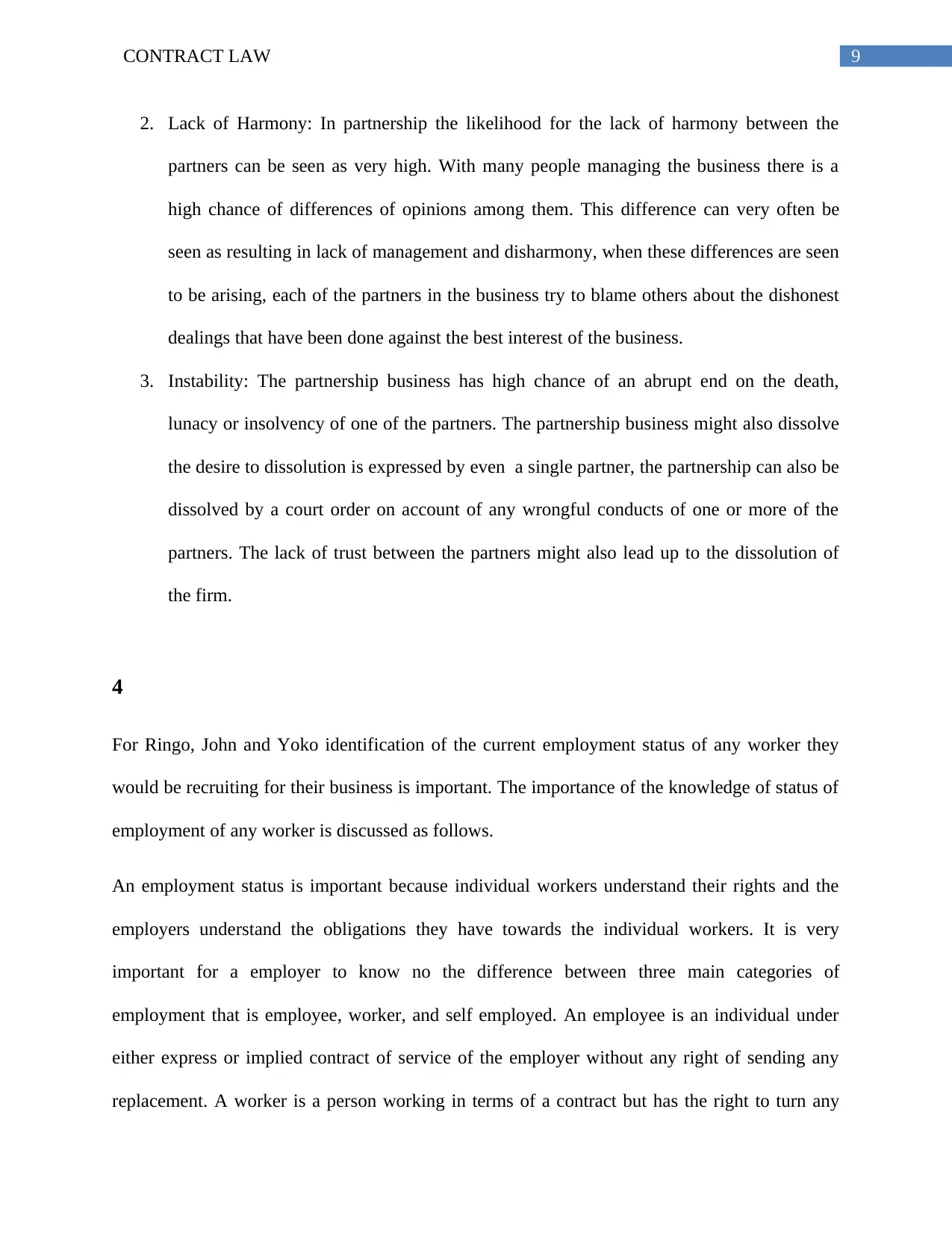
9CONTRACT LAW
2. Lack of Harmony: In partnership the likelihood for the lack of harmony between the
partners can be seen as very high. With many people managing the business there is a
high chance of differences of opinions among them. This difference can very often be
seen as resulting in lack of management and disharmony, when these differences are seen
to be arising, each of the partners in the business try to blame others about the dishonest
dealings that have been done against the best interest of the business.
3. Instability: The partnership business has high chance of an abrupt end on the death,
lunacy or insolvency of one of the partners. The partnership business might also dissolve
the desire to dissolution is expressed by even a single partner, the partnership can also be
dissolved by a court order on account of any wrongful conducts of one or more of the
partners. The lack of trust between the partners might also lead up to the dissolution of
the firm.
4
For Ringo, John and Yoko identification of the current employment status of any worker they
would be recruiting for their business is important. The importance of the knowledge of status of
employment of any worker is discussed as follows.
An employment status is important because individual workers understand their rights and the
employers understand the obligations they have towards the individual workers. It is very
important for a employer to know no the difference between three main categories of
employment that is employee, worker, and self employed. An employee is an individual under
either express or implied contract of service of the employer without any right of sending any
replacement. A worker is a person working in terms of a contract but has the right to turn any
2. Lack of Harmony: In partnership the likelihood for the lack of harmony between the
partners can be seen as very high. With many people managing the business there is a
high chance of differences of opinions among them. This difference can very often be
seen as resulting in lack of management and disharmony, when these differences are seen
to be arising, each of the partners in the business try to blame others about the dishonest
dealings that have been done against the best interest of the business.
3. Instability: The partnership business has high chance of an abrupt end on the death,
lunacy or insolvency of one of the partners. The partnership business might also dissolve
the desire to dissolution is expressed by even a single partner, the partnership can also be
dissolved by a court order on account of any wrongful conducts of one or more of the
partners. The lack of trust between the partners might also lead up to the dissolution of
the firm.
4
For Ringo, John and Yoko identification of the current employment status of any worker they
would be recruiting for their business is important. The importance of the knowledge of status of
employment of any worker is discussed as follows.
An employment status is important because individual workers understand their rights and the
employers understand the obligations they have towards the individual workers. It is very
important for a employer to know no the difference between three main categories of
employment that is employee, worker, and self employed. An employee is an individual under
either express or implied contract of service of the employer without any right of sending any
replacement. A worker is a person working in terms of a contract but has the right to turn any
Paraphrase This Document
Need a fresh take? Get an instant paraphrase of this document with our AI Paraphraser
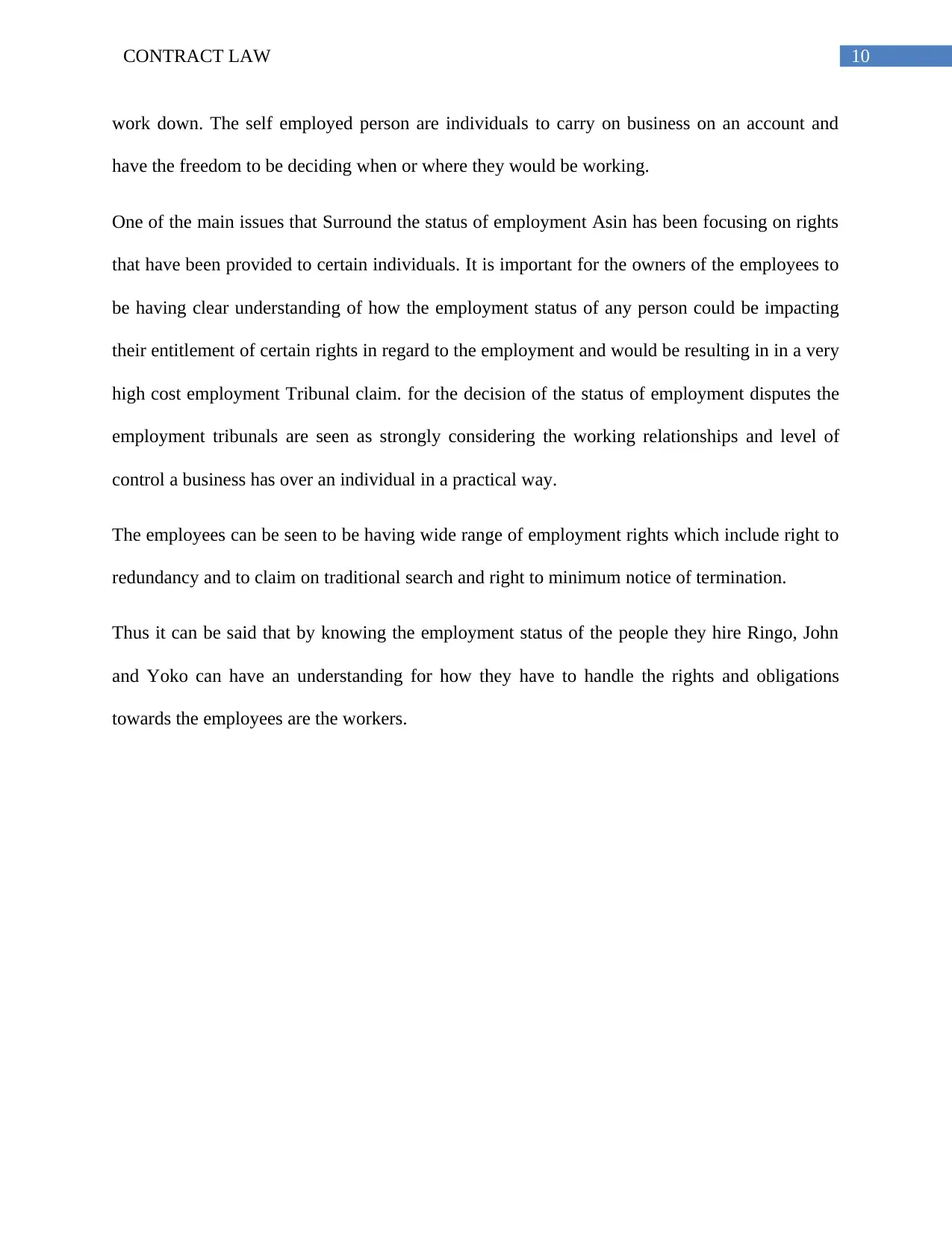
10CONTRACT LAW
work down. The self employed person are individuals to carry on business on an account and
have the freedom to be deciding when or where they would be working.
One of the main issues that Surround the status of employment Asin has been focusing on rights
that have been provided to certain individuals. It is important for the owners of the employees to
be having clear understanding of how the employment status of any person could be impacting
their entitlement of certain rights in regard to the employment and would be resulting in in a very
high cost employment Tribunal claim. for the decision of the status of employment disputes the
employment tribunals are seen as strongly considering the working relationships and level of
control a business has over an individual in a practical way.
The employees can be seen to be having wide range of employment rights which include right to
redundancy and to claim on traditional search and right to minimum notice of termination.
Thus it can be said that by knowing the employment status of the people they hire Ringo, John
and Yoko can have an understanding for how they have to handle the rights and obligations
towards the employees are the workers.
work down. The self employed person are individuals to carry on business on an account and
have the freedom to be deciding when or where they would be working.
One of the main issues that Surround the status of employment Asin has been focusing on rights
that have been provided to certain individuals. It is important for the owners of the employees to
be having clear understanding of how the employment status of any person could be impacting
their entitlement of certain rights in regard to the employment and would be resulting in in a very
high cost employment Tribunal claim. for the decision of the status of employment disputes the
employment tribunals are seen as strongly considering the working relationships and level of
control a business has over an individual in a practical way.
The employees can be seen to be having wide range of employment rights which include right to
redundancy and to claim on traditional search and right to minimum notice of termination.
Thus it can be said that by knowing the employment status of the people they hire Ringo, John
and Yoko can have an understanding for how they have to handle the rights and obligations
towards the employees are the workers.
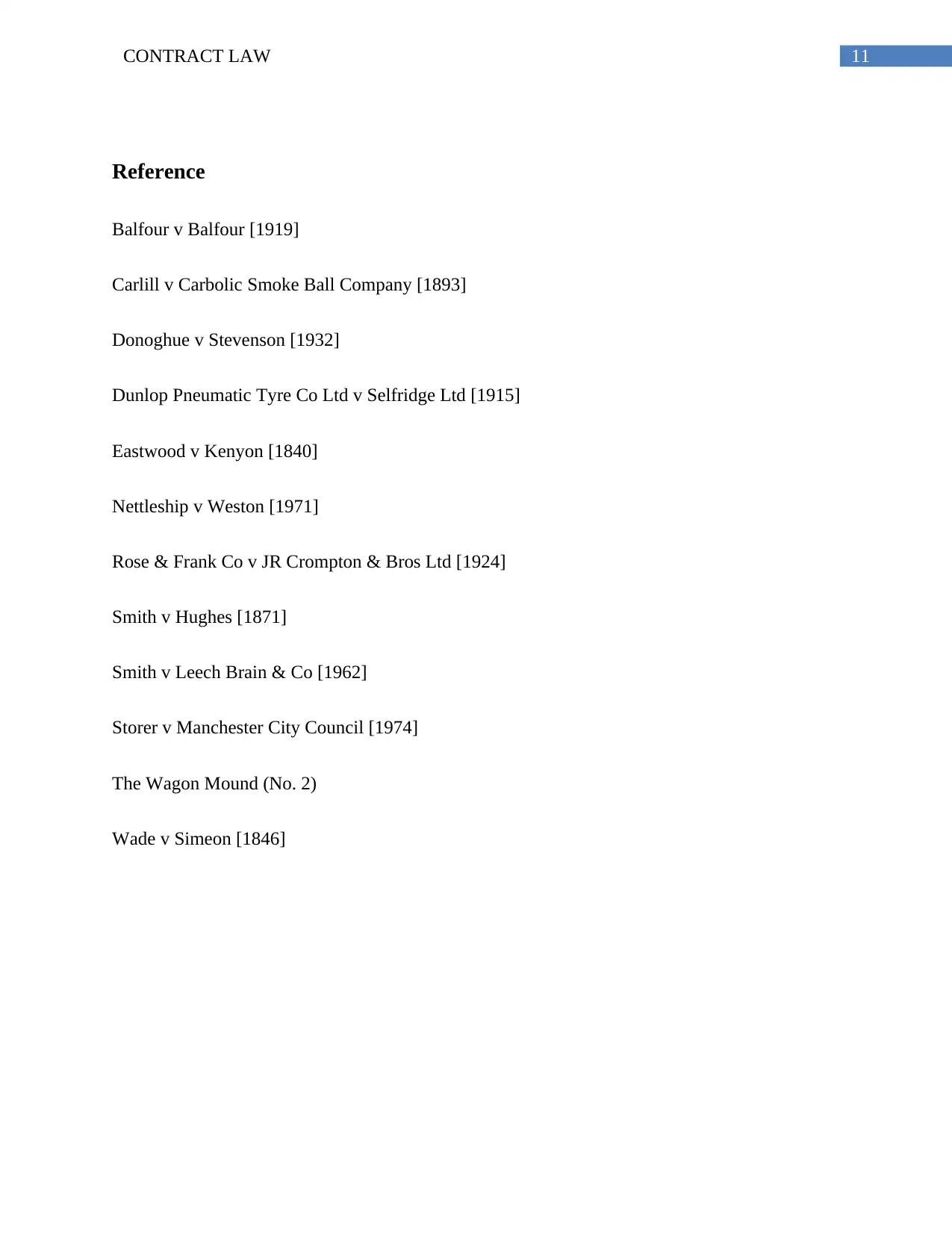
11CONTRACT LAW
Reference
Balfour v Balfour [1919]
Carlill v Carbolic Smoke Ball Company [1893]
Donoghue v Stevenson [1932]
Dunlop Pneumatic Tyre Co Ltd v Selfridge Ltd [1915]
Eastwood v Kenyon [1840]
Nettleship v Weston [1971]
Rose & Frank Co v JR Crompton & Bros Ltd [1924]
Smith v Hughes [1871]
Smith v Leech Brain & Co [1962]
Storer v Manchester City Council [1974]
The Wagon Mound (No. 2)
Wade v Simeon [1846]
Reference
Balfour v Balfour [1919]
Carlill v Carbolic Smoke Ball Company [1893]
Donoghue v Stevenson [1932]
Dunlop Pneumatic Tyre Co Ltd v Selfridge Ltd [1915]
Eastwood v Kenyon [1840]
Nettleship v Weston [1971]
Rose & Frank Co v JR Crompton & Bros Ltd [1924]
Smith v Hughes [1871]
Smith v Leech Brain & Co [1962]
Storer v Manchester City Council [1974]
The Wagon Mound (No. 2)
Wade v Simeon [1846]
⊘ This is a preview!⊘
Do you want full access?
Subscribe today to unlock all pages.

Trusted by 1+ million students worldwide
1 out of 13
Related Documents
Your All-in-One AI-Powered Toolkit for Academic Success.
+13062052269
info@desklib.com
Available 24*7 on WhatsApp / Email
![[object Object]](/_next/static/media/star-bottom.7253800d.svg)
Unlock your academic potential
Copyright © 2020–2026 A2Z Services. All Rights Reserved. Developed and managed by ZUCOL.




